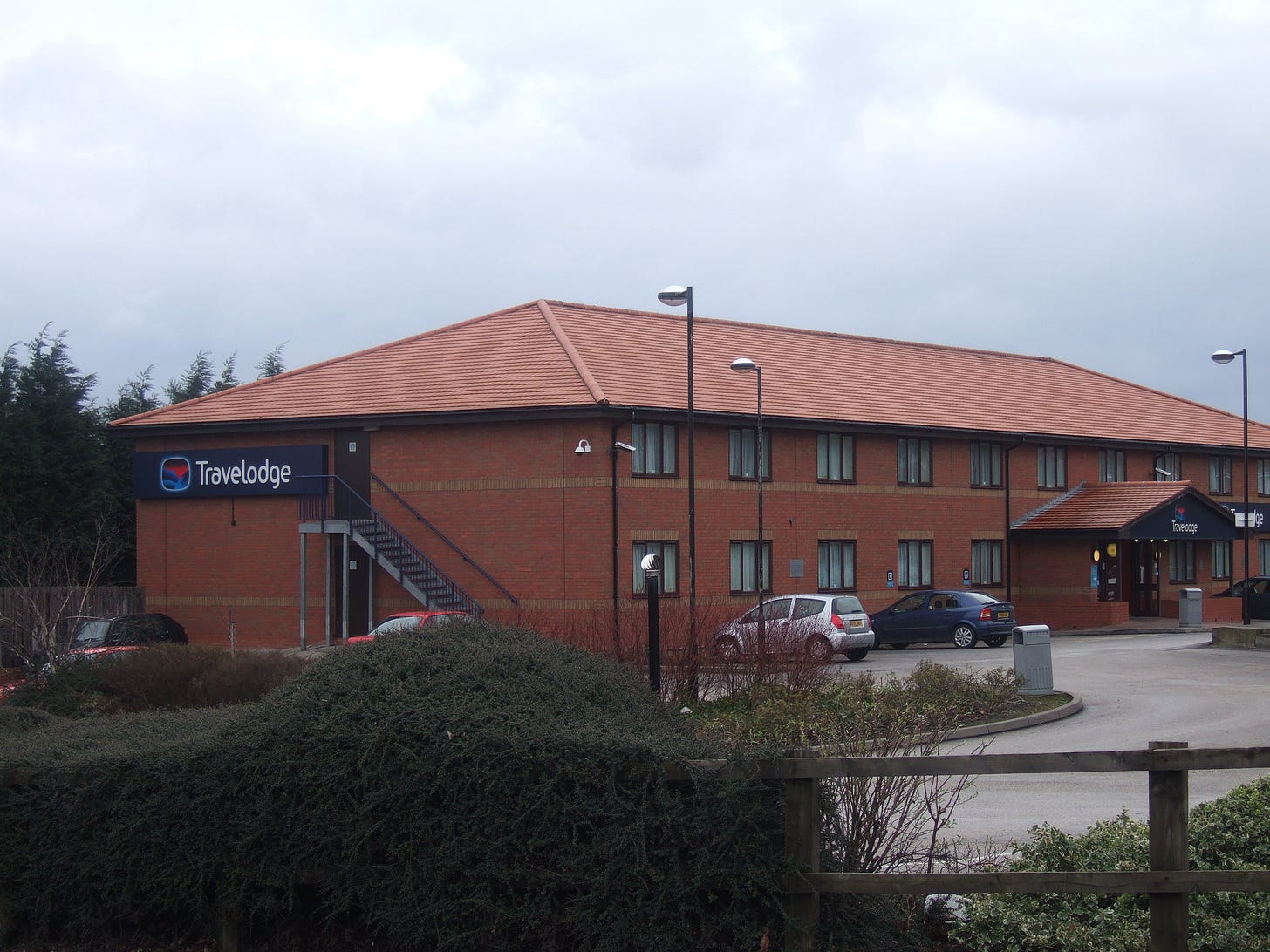Instead of social housing, councils spend tens of millions on "temporary" hotels
Residents on waiting lists are being shunted between privately owned B&Bs, hotels and hostels. We filed Freedom of Information requests to two councils to find out the costs.

Over the last five years, Derbyshire County Council has spent £9,426,456 on temporary accommodation in hotels, hostels and B&B’s for people on social housing waiting lists, The Lead can disclose, while Leicester council has spent over £13,000,000 in the same period. The figures were confirmed to The Lead following freedom of information requests, illustrating the extraordinary spending by councils on temporary accommodation, including in privately owned hotel chains.
Charlotte,* from Derby, worked as a nurse for over 20 years until she was diagnosed with chronic obstructive pulmonary disease, a terminal lung condition that left her unable to work. Despite her illness and disability, when her landlord decided to sell her home she found herself at the bottom of a seemingly never-ending list of people waiting for a council house. This meant she spent the next seven months being moved between various hostels and hotels in Derby.
“The whole thing was a living nightmare,” she told The Lead. “I had lived in my property for over ten years, I never imagined that I’d find myself without a home. When I was first placed in a hostel in town, I couldn’t even get up and down the stairs properly because of my disability. Eventually, I was moved to a Travelodge, which did have a lift. But it was like the council forgot about me, I was left to rot.”
Charlotte’s breathing difficulties meant that she was even more isolated from her routine and her support network because of her frequent moves and the travel they required. “I haven’t been able to work for about six years, because my COPD has developed to the next stage,” she said. “It’s a death sentence really. Since being out of work I have volunteered in my local community to keep myself busy. Obviously, when they started putting me in the hotels, I was too far away to get to my volunteer placements. The one thing that kept me sane was taken away from me.”
The Lead submitted FOI requests to both Derbyshire Homes, who work on behalf of Derbyshire City Council to maintain the Council’s housing stock, and Leicester City Council. Their data found that between 2019 and 2024, Derbyshire Homes have spent £9,426,456 on temporary accommodation in hotels, hostels and B&B’s for those on social housing waiting lists since 2019. Nearby, Leicester council has spent just over £13 million pounds on hostels and hotels to temporarily house people on social housing waiting lists since 2019. This number has been increasing drastically, with 2023 alone costing Leicester just over £3.5 million.
These figures offer an insight into council spending on hotels, hostels and B&B’s, which has been rising throughout the UK. Last year, The Guardian reported that councils across Britain had spent over 1.7 billion pounds per year housing people in temporary accommodation. On top of this, the amount of spending allocated on temporary housing had doubled since 2015-2016, and clearly proves that “temporary” housing via hotels, hostels and B&B’s has become a permanent and expensive solution.
Many councils are not able to build the amount of new homes needed with the local budgets provided by the government. The ongoing costs required to maintain council houses also pose a problem, which is why so many councils have become reliant on housing associations to manage their council house stock. This chronic underinvestment has allowed the situation to spiral beyond the control of local councils.
Another issue revolves around policies and regulation surrounding building new homes, particularly land laws, which Labour has recently vowed to reform. Additionally, according to the Local Government Association, the price of land has inflated in line with the potential to transform land into luxury accommodation, which means local councils are priced out of buying space which can be transformed into quality social housing by property developers.
Finally, the Right to Buy Scheme has also seriously depleted council property stock and has incentivised councils into selling off council houses to make up for their dwindling budgets. Big Issue has reported that over two million council houses have been sold since Right to Buy was introduced by Margaret Thatcher. Baggi Shanker, the Labour councillor for Derby South, has claimed in an op-ed for Derbyshire Live last summer that almost half of the stock in Derby has been depleted via the scheme.
“A lack of ambition and urgency”
Poor management and planning for building councils has also been reported as a reason for failing to build new council homes. In Derby, a recent investigation by Derby News journalist Russell Pollard exposed ‘incompetent’ management across six housing projects run by Derby Homes. These projects had the potential to build 93 properties with 158 bedrooms, but despite 3 of these projects having planning permission since 2019, new homes have yet to have been built. Proposed dates to start building have not been met, and 6 of these new sites remain empty with no building work commenced. According to Russell: “It all suggests a lack of ambition and urgency.”
All of these issues have been bad news to renters or those reliant on council houses. And, while an alternative to temporary accommodation can be finding a private landlord, many refuse to take on tenants with pets, children or in receipt of benefits. Private landlords are also under less obligation to fix issues within their properties, and are generally less regulated than social housing landlords, which means some people end up suffering in poor quality housing with nobody to turn to for support.
Eventually, Charlotte managed to secure her own privately rented accommodation, but now her rent is more expensive than social housing, which means the cost of living crisis is hitting her harder than ever before. Charlotte is far from the the only one who’s suffered. Now, even those with children are finding themselves unable to get a council house. The Big Issue recently reported that a record 151,630 children are now homeless and living in temporary accommodation in England. As housing campaigner Kwajo recently pointed out, this is enough children to fill Wembley Stadium.
“We need more council houses, end right to buy, scrap section 21, rent controls and improve conditions for renters.”
Living in temporary accommodation like hotels isn’t easy. While occupying a hotel, people are not registered at a fixed address, which complicates processes like voting in local and national elections, receiving mail, registering children at schools or being able to visit your local doctor or dentist. On top of this, conditions can be cramped, crowded and uncomfortable, as those living in hotels are forced to share a single room and don’t have access to their own kitchen or washing machine.
Joanne* is a 30 year old mother of two who lives in Derby and found herself in hotel accommodation with her two children, after private landlords refused to place her due to her receiving benefits. She was forced to move out of her mother’s home due to overcrowding and was placed in a hotel miles from her children’s school and nursery: “I desperately wanted to find a job so I could try and find a private rental, but it was impossible when caring for two young children as a single mum”
When Joanne was eventually housed, she was placed on the opposite side of the city away from her mum, which meant changing one of her children’s schools and losing her family support.
Joanne and Charlotte are just two out of the 10,000 people waiting for a council house in Derby. Last Christmas, 653 people were registered as homeless, with 639 living in temporary accommodation, 342 of which were children. Charities and grassroots organisations have been left fighting the battle for tenants. ACORN are one of these charities, who offer local support for tenants and the homeless, as well as campaigning on a national level.
“People are being put into unsuitable temporary accommodation due to a lack of decent affordable housing,” says Paul Williams, head of the Nottingham branch of housing union ACORN. “The solutions are actually quite simple. We need more council houses, end right to buy, scrap section 21, rent controls and improved conditions for renters.” The Nottingham branch where he is based, has been supporting members in resisting evictions, and rent hikes, as well as our national campaigns to reform renting and build more affordable homes.
While the efforts of local charities and organisations remain invaluable to help tackle the effects of the housing crisis, the government has clearly been missing from the frontline for decades.
The Lead approached the Department for Levelling Up Housing and Communities to see what actions they would be taking to reduce the number of people living in temporary accommodation throughout the UK. A spokesperson said: “ “We are taking action to fix this by working with local leaders to develop a long-term strategy to end homelessness, and we have given Leicester and Derby councils almost £4 million each through the Homelessness Prevention Grant from 2022 to 2025 to help them prevent and reduce homelessness in their areas.”
When told about the government's claims, Joanne, for her part, was apprehensive: “They need to take action, now, not next month, or the one after. How many more people are living in hotels, wasting away with their young children?”
*Names have been changed





